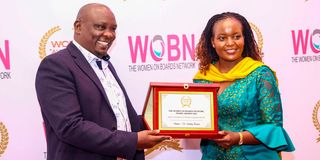Dr Stanley Kamau feted for Ambulance Mashinani drive

Ahadi Kenya CEO Stanley Kamau receives an award from the President’s Cabinet Advisor on Women Rights Agencies, Harriet Chigai, during an award ceremony by the Women on Boards Network (WOBN) on November 24, 2023 at Radisson Blu Hotel, Nairobi.
What you need to know:
- Thousands of pregnant women, across the country, have benefitted from Dr Stanley Kamau's Ambulance Mashinani initiative.
- The ambulances are also used in the grassroots to help accident victims, jigger-infested residents and people living with disabilities, among others.
When Stanley Kamau started the Ambulance Mashinani initiative in 2007, he never thought it would become a talk of Kenya’s remote areas.
The innovation became a beacon of hope for pregnant women. As a result, he says, Dr Kamau rolled it out across the country, giving priority to hardship areas.
Ambulance Mashinani, designed to access hard to reach areas, is equipped with medical supplies and other equipment, including a bed, First-Aid kit and a child-delivery kit.
It is also fitted with mobile phones to ease communication with doctors. In an interview with Nation.Africa, Mr Kamau says the ambulances are also fixed with portable ultrasound machines to take scan expectant mothers if ned arises.
“We have trained community health workers to become midwives and support women to deliver when the time comes,” Dr Kamau says.
Majority of poor people living in rural areas, especially expectant mothers and the physically challenged have difficulties accessing medical facilities.
They have no means of communication, can’t walk, or afford to pay for transport no matter how cheap. As a result, majority are unable to go to hospital and others end up missing on medical appointments or routine health checks. The ambulances provide them with transport to and from hospital.

Ahadi Kenya Trust Chairman Dr Stanley Kamau (right) when he handed over an ambulance in his Ambulance Mashinani Initiative at the Nakuru Governor's Office in March 2019.
Thousands of pregnant women have benefitted from the initiative.
So far, Dr Kamau says there are 485 ambulances Mashinani distributed across the 47 counties, which has helped more than 100,000 expect mothers.
“Every week, thousands of expectant women across the country, benefit through the Ambulance Mashinani. They are able to give birth in dignity. In cases of emergency, they have county ambulances contacts, and they organise to meet halfway,” he says.
Expectant mothers accompanied by a caregiver, are normally rushed to hospital using the covered ambulance to protect the patient from exposure to wind and dust.
After discharge from hospital, the recovering mother is taken back home.
The ambulances are also used in the grassroots to help accident victims, jigger-infested residents and people living with disabilities, among others.
When we meet Dr Kamau at his Nairobi office, he is all smiles, thanks to a recent recognition by the Women on Board Kenya (WOBN) for his work in empowering women. He was declared winner for the Women on Board Network Award 2023, in the Male Champion of Women Agenda Award category.
Expectant mothers
He says the recognition motivates and encourages him to continue with the women’s cause.
“It feels good to see that there are people out there who see and appreciate the work I have been doing,” he says.
Dr Kamau came to the limelight through his anti-jigger campaign.
Eunice Kiunga, a social worker in Murang’a says the ambulance has been of great help to expectant mothers in Maragua, Kandara, Gaichanjiru and Kenol areas.
“The Ambulance Mashinani was godsend. It has helped hundreds of women here get to hospital, and deliver on time,” Ms Kiunga tells Nation.Africa.
She adds the initiative has reduced cases of maternal mortality in the area, as more women are now able to give birth in hospitals.
In 2015, Kenya was categorised among 18 Sub-Saharan countries with high maternal mortality rates.
The country’s reduction of maternal mortality rate (MMR) has been slow with a decline of 432 in 2010 to 353/100,000 live births in 2015. The current Kenya’s MMR is 362/100,000 live births
The percentage of women giving birth in the presence of a skilled birth attendant has almost doubled, from 37 percent in 2017 to 69.5 per cent in 2021, according to the Kenya Health Information System (KHIS).
Supported women
That is slightly better than the national average, which was 65.3 per cent as of June 2021, according to KHIS. Apart from championing maternal health, Dr Kamau has also played a role in supporting women in leadership.
He lifts the lid to having supported many women who were vying for members of county assembly (MCAs) and MPs in the previous election with material support, including money for nomination.
During the former President Uhuru Kenyatta’s regime, he acted as a Mother and Child advisor for the Beyond Zero Campaign that was spearheaded by former First Lady Margaret Kenyatta.
He is currently an advisor to Tessie Mudavadi, on women empowerment. His happiest moment, he says, is when he sees people he has empowered stand on their feet.
As part of economically empowering women, he reveals that he has been donating posho mills to women in the rural and urban areas. This, he says, helps the women earn an income.
In addition, he has been championing widows’ empowerment through various initiatives, and pushing for land ownership policies that border on gender equality.
Stop fearing
“Men should stop fearing that once empowered, women will become powerful. We need to start empowering women from our households. I believe that men and women must be equitably and actively involved in decision-making and problem solving in order for the community to thrive,” he says.
He singles out limited financial resources, cultural practices and lack of political goodwill in some communities, as some of the major setbacks derailing the push for women empowerment.





